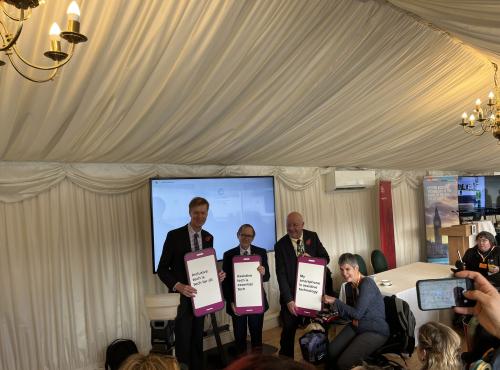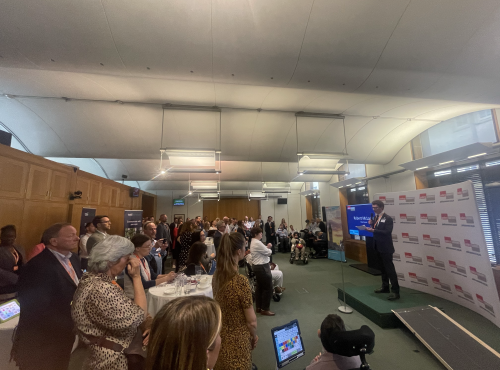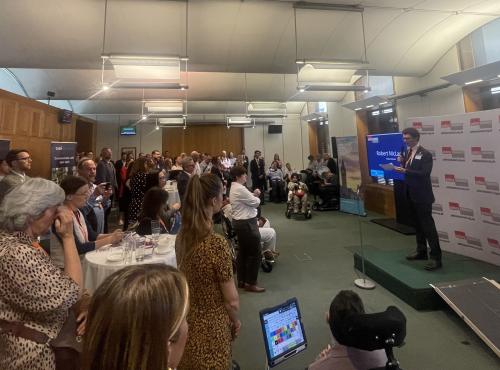Lack of tech shuts disabled people out of job opportunities
The All-Party Parliamentary Group for Assistive Technology calls for an empowered National Assistive Technology Champion to develop and deliver a framework guaranteeing access to digital that works for all.
The All-Party Parliamentary Group for Assistive Technology (APPGAT) welcomes the Chair of the Work and Pensions Select Committee Stephen Timms MP to the launch of their new report, Talent & Technology: Building bridges to employment for disabled people.
The report, co-chaired by Lilian Greenwood MP and Lord Shinkwin and produced by Policy Connect, recognises the enormous potential of assistive technology to ensure access to work for disabled people. The inquiry has seen first-hand its powerful benefits, with examples including a visually-impaired person using a screen reader to access a recruiting site, a person with Muscular Dystrophy using a mouth stick to navigate an application form, and an autistic person using a specialised app to help them travel to an interview.
Unfortunately, it has also heard difficult stories of disabled people unable to look for and obtain work, due to inaccessible technologies, poor digital practices by organisations, and a lack of skills. Disabled people are repeatedly shut out of the very schemes designed to offer a starting point in careers, such as apprenticeships or employment support through the job centre.
The pandemic has changed the way we work and thereby shone an even brighter light on existing digital inequalities. Urgent action is required to ensure the future world of work is accessible to all.
It is against this background that this report makes recommendations to government, education providers and employers – on how to ensure the world of work is accessible to everyone.
The government should appoint and empower a National Assistive Technology Champion.
The Champion will lead on developing and delivering, in collaboration with disabled people, a framework on disabled peoples’ life transitions that guarantees access to digital technology which does meet the needs of the individual at all stages of life.
Proactively removing digital barriers to employment
The government should take advantage of existing JobCentre Plus (JCP) structures to identify and remove digital barriers to employment for JCP customers, and the DWP should recognise digital access as a key enabler of employment for all customers.
Allowing SMEs to tap into talent of disabled people
The government should improve targeting of disability support schemes to employers and employees who need them most and take advantage of existing networks to skill up employers on digital accessibility and inclusive recruitment practices. Employers should ensure their recruitment and on-boarding practices are digitally accessible and inclusive by following guidance produced by Disability Confident Leaders.
Kaki Mungai, AT user: “Assistive technology has saved my life and made me who I am today. Life has become manageable and I would recommend it to everyone who struggles.”
Geena Vabulas, report author: “Digital access and digital skills are no longer optional for finding work, even in non-tech industries. The reality is that many ‘standard’ technologies, websites, and applications are inaccessible to disabled and older people. However, recent advances in technology mean that AT can now remove barriers in a wider variety of settings than ever before.”
Lilian Greenwood MP, co-chair of the inquiry: “The Government must take the lead on ensuring that disabled people have equal access to work and training opportunities. The UK is already a world-leader in the development of assistive technologies and Government should harness the power of these tools to make the world of work accessible to all."
Notes to editors
For further information contact Alice Webster alice.webster [at] policyconnect.org.uk (Alice[dot]Webster[at]policyconnect[dot]org[dot]uk)
About this report
The research leading to this report was conducted by Policy Connect on behalf of the All-Party Parliamentary Group for Assistive Technology, and its author Geena Vabulas is a member of Policy Connect’s Health and Accessibility Team. The inquiry was sponsored by City Bridge Trust and the Ian Karten Charitable Trust.
The lead recommendations of the report are:
1. The Government should appoint and empower a National Assistive Technology Champion.
2A. Education providers should ensure careers education, information, advice and guidance (CEIAG) and disability support and guidance is joined-up so that education leavers know how to access AT and support to enable their transition into employment.
2B. The DfE should produce and promote guidance and resources for education providers on assistive technology and workplaces and preparing for employment.
3. The DfE and DWP should collaborate to ensure that disabled people on work placements/traineeships/apprenticeships are able to use assistive technology from Day One of their placements.
4A. The government should take advantage of existing JobCentre Plus (JCP) structures to identify and remove digital barriers to employment for JCP customers.
4B. The DWP should recognise digital access as a key enabler of employment for all customers, including those who are disabled.
5A. The government should improve targeting of disability support schemes to employers and employees who need them most.
5B. The government should take advantage of existing networks, such as Disability Confident, to skill up employers on digital accessibility and inclusive recruitment practices
5C. Employers should ensure their recruitment and on-boarding practices are digitally accessible and inclusive by following guidance produced by Disability Confident Leaders.
6. The government should measure the success of Access to Work’s grants according to the impact on customers.
About Policy Connect
Policy Connect is a cross-party think tank with four main policy pillars which are: Education & Skills; Industry, Technology & Innovation; Sustainability; and Health & Accessibility.
We specialise in supporting parliamentary groups, forums and commissions for which Policy Connect provides the secretariat and delivers impactful policy research and event programmes. Our collaboration with parliamentarians through these groups allows us to influence public policy in Westminster and Whitehall. We are a social enterprise and are funded by a combination of regular annual membership subscriptions and time-limited sponsorships.
We are proud to be a Disability Confident and London Living Wage employer, and a member of Social Enterprise UK.
About the All-Party Parliamentary Group for Assistive Technology
The All-Party Parliamentary Group for Assistive Technology aims to disseminate knowledge, generate debate and facilitate engagement on assistive technology amongst Members of both Houses of Parliament. The secretariat of the APPGAT is provided by Policy Connect.



